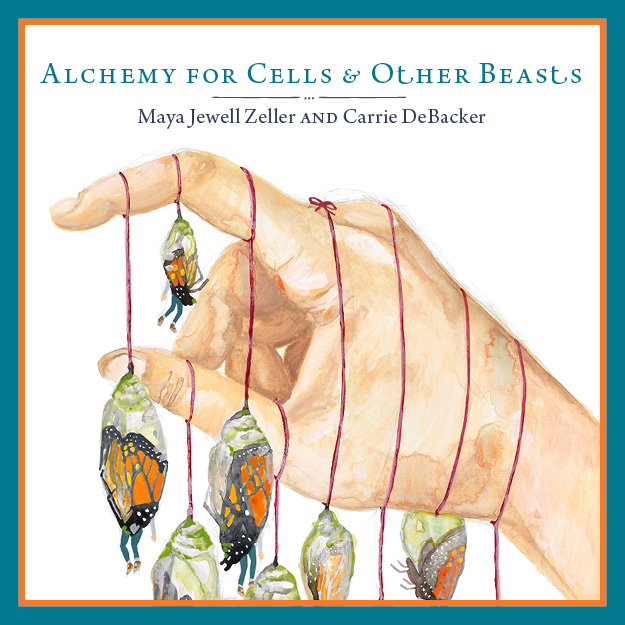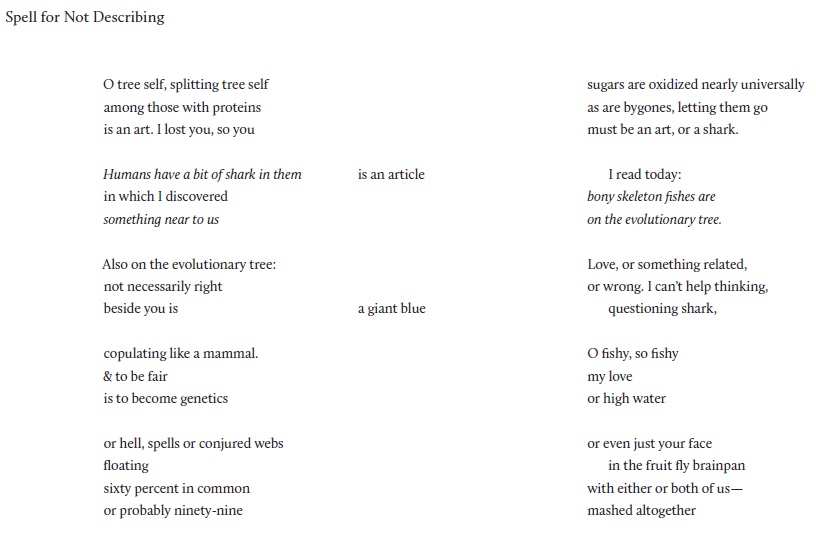 The best collaborations are seamless, done in tandem so that the work we experience is a genuine union, a synthesis of two aesthetic sensibilities. They also offer a space for dialogue, where the work of each artist enters into a conversation with the other, producing something that is wholly of the moment, yet lasting.
The best collaborations are seamless, done in tandem so that the work we experience is a genuine union, a synthesis of two aesthetic sensibilities. They also offer a space for dialogue, where the work of each artist enters into a conversation with the other, producing something that is wholly of the moment, yet lasting.
In their partnered book, Alchemy for Cells and Other Beasts, the poetry of Maya Jewell Zeller blends with the watercolors of Carrie DeBacker in such a way as to sit snuggly on high quality end of the spectrum of collaboration. DeBacker’s responses to Jewell Zeller’s text are widely varied – at times dancing around the poetry, possessed with just a hint of its imagery, then becoming at turns less evocative and more provocative of the poem, while at other moments text and image form inviolate parts that together illuminate. Jewell Zeller and DeBacker have created a text centered on the body in the world (“Matter is a state of being, of existing/ in the cave of a consciousness...”), focusing specifically the female body.
We are initiated through a reading of deep time, what could be called geologic consciousness through biological presence, in ‘Spell for Addressing Turtles’:
Formed in the Cretaceous when chalk too was forming / the
metaphor of you is old / older than America / older
than the appropriation of indigenous imagery and
indigenous land / turtle, let it be said / I do not condone
appropriation / but I do want to be like a turtle
Jewell Zeller gives us a sort of sweeping survey, grounding us in myth, religion, science, and then finally our contemporary moment, taking us from Gary Snyder to Pokemon, a move which can’t help but feel trivial, yet proves legitimately the best way to get at the heart of the subject. This playfulness imbues much of the poems here, and it is equally reflected in the illustrations, where DeBacker frequently fuses the animal, the inanimate, and the human to create hybrid creatures, much like those populating Greco-Roman mythology.
The poems also encounter the body through illness, centering that malady which is not located entirely within the individual, but arises from individual’s place within the social matrix. As in ‘i need large electric oven roaster, around 20 qt. If you have one taking up space, get back to me. I’m using it to heat alibates chert for knapping.’ Here, too, the speaker dwells on her neighbor,
I am thinking of your daughter in her
hospital bed / how she cannot quite recover from her stroke,
how you can do nothing / in the end / time owning us as small
specks on a wheel
From there, the text ties an immediate lived moment back to an ever-present geologic consciousness,
what is history
anyway / David has lived here 30 years before me / & the
chert 30 or so million years before us / or 3.5 billion / what
is the difference to a tiny human
While this passage seems to suggest estrangement or some kind of fatalism, Jewell Zeller steers us to a different shore:
at your earliest
convenience / I want to help you chip rock from rock / I want
to assist you in whatever task you find necessary / to stave off
the inauguration / of a new, unpreservable terror
Here, the speaker moves towards intimacy through simple kindness. It is an act that bridges not just the infinite distance between subjects, but also, time, denuding mortality of any threat.
In a way, these poems operate as incantations. Indeed, many of them are titled as “spells.” What the poetry strives to bring about, whether through the magic of words or the evocative nature of the watercolors, is a kind of transmutation. Jewell Zeller and DeBecker teach us how our thoughts and experiences can transform not just our world, but our very psyche, cultivating a consciousness that holds no divide, a mind that is border and transgression, moving elegantly between states of being. All, of course, this philosophizing is done in language that is casually elegant. Take, for example, ‘little spell for kestrel hovering / for x-ray & mothering’:
if you watch in slow motion / the flecked kestrel / on
YouTube / you’ll watch your own lungs fanning out against the
sun
Or the dynamic page of ‘Spell for Not Describing’
Jewel Zeller locates us in a textual landscape that is imminently vibrant, demanding our attention. When we read these poems, and take in the illustrations, we are no longer passive creatures, but rather, individuals engaged in a sort of alchemy. The girls and women of these poems, both the speakers and the subjects, create the world by enticing readers to “unlace this alchemous beast/ with me.” As readers, we at once admire and feel ourselves drawn into this worldview. The best eco-poetry as well as ecofeminism grounds us, making us acutely aware of not just the body and place, but how we are entwined, with and not separate from nature.
Daniel Casey has a MFA in Creative Writing from the University of Notre Dame. He tweets as @misanthropester and writes at misanthropester.com. He lives in Murray, Kentucky.

